Items
[Any property] contains
women
-
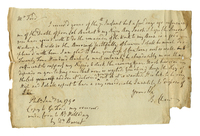 Note to George Ford from Benjamin Chew on shipment of clothing for enslaved people, May 20, 1790 Detailed list of clothing for enslaved people of Whitehall, including Aaron, Yarm, David, Sukey, Peg, Beck, Ruth, and unnamed children. Chew lists shirts for seven men, one pair of "trowsers [sic] cut out for a pattern", 15 yards of linen, "trowsers" for six negro men, seven women's shifts, and seven petticoats. He states that either he or his son will be arriving in Kent soon.
Note to George Ford from Benjamin Chew on shipment of clothing for enslaved people, May 20, 1790 Detailed list of clothing for enslaved people of Whitehall, including Aaron, Yarm, David, Sukey, Peg, Beck, Ruth, and unnamed children. Chew lists shirts for seven men, one pair of "trowsers [sic] cut out for a pattern", 15 yards of linen, "trowsers" for six negro men, seven women's shifts, and seven petticoats. He states that either he or his son will be arriving in Kent soon. -
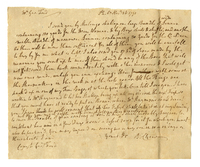 Note to George Ford from Benjamin Chew on shipment of clothing linen and shoes for enslaved people, November 26, 1792 Sent to Whitehall by Sterling's shallop- 120 yards of linen for the "men, women, and big Boys shirts and shifts" and another smaller bundle containing 30 yards of "narrower linnen" for the children. Also included were 17 pairs of shoes "made by the measures you sent".
Note to George Ford from Benjamin Chew on shipment of clothing linen and shoes for enslaved people, November 26, 1792 Sent to Whitehall by Sterling's shallop- 120 yards of linen for the "men, women, and big Boys shirts and shifts" and another smaller bundle containing 30 yards of "narrower linnen" for the children. Also included were 17 pairs of shoes "made by the measures you sent". -
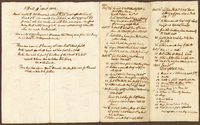 Whitehall memorandum accounting the enslaved women's clothing and the distribution of wheat, 1801-1802 Multiple memos on the same document, spanning 1801-1802. This first page, dated 1801, primarily focuses on farm work and livestock. The second page, dated January 1802, begins with clothing measurements for petticoats and jackets for Sylvia, Sal, Tish & Lucey, Little Sal & Judy, and Sukey & Phin. The fabric is described as “21 yds blue cloth” from Crossroads. In the section next to it is an account of the crop of wheat from 1800, taken from Porter on June 12, 1801: ▪ Used for his share – 2 ▪ Let Merit [Merrit] have of Mr Chews – 2 ▪ Gave yr black People of do [Mr. Chew's]– 4 ½ ▪ Used of his share – 1 ▪ Sold Comerford of [ditto] – 30 ▪ Used on acct of his Share – 7 ▪ Used at Mill on [ditto] – 1 ½ ▪ Lent Vanwinkle on [ditto] – 2 ▪ Lent Abby on [ditto] – 3 ▪ Sent to Philade[lphia] – 900 ▪ Sent to Mill for Harvest – 14 -[total] 1102 ▪ Sold Tailings weight 55 ½ @ 15 for 60 to any to £13.3.72 – 19 The next page includes amounts of linen for clothing for the enslaved people. First are shirts for Abby, Sharper, Enos, Cato, Dick, Aaron, Jas Senior, Jas Jr, Yarm and Ben. Next are measurements for shifts for Silvia & Lucey [Lucy], Sarah, Sal Jr, Sukey, and Phin. Also listed are measurements for trowsers for the same men, and petticoats for the same women, plus Judith. The last page mentions the hiring out of Sarah: “…write to Mr Raymond about Calhouns Negro Jacob for the hire of Sarah & 2d who went to live with him in Dec 1795 at £3 p ann She has continued with him ever since – he effects to say that although free of late he was not absolutely liberated when he made his contract”.
Whitehall memorandum accounting the enslaved women's clothing and the distribution of wheat, 1801-1802 Multiple memos on the same document, spanning 1801-1802. This first page, dated 1801, primarily focuses on farm work and livestock. The second page, dated January 1802, begins with clothing measurements for petticoats and jackets for Sylvia, Sal, Tish & Lucey, Little Sal & Judy, and Sukey & Phin. The fabric is described as “21 yds blue cloth” from Crossroads. In the section next to it is an account of the crop of wheat from 1800, taken from Porter on June 12, 1801: ▪ Used for his share – 2 ▪ Let Merit [Merrit] have of Mr Chews – 2 ▪ Gave yr black People of do [Mr. Chew's]– 4 ½ ▪ Used of his share – 1 ▪ Sold Comerford of [ditto] – 30 ▪ Used on acct of his Share – 7 ▪ Used at Mill on [ditto] – 1 ½ ▪ Lent Vanwinkle on [ditto] – 2 ▪ Lent Abby on [ditto] – 3 ▪ Sent to Philade[lphia] – 900 ▪ Sent to Mill for Harvest – 14 -[total] 1102 ▪ Sold Tailings weight 55 ½ @ 15 for 60 to any to £13.3.72 – 19 The next page includes amounts of linen for clothing for the enslaved people. First are shirts for Abby, Sharper, Enos, Cato, Dick, Aaron, Jas Senior, Jas Jr, Yarm and Ben. Next are measurements for shifts for Silvia & Lucey [Lucy], Sarah, Sal Jr, Sukey, and Phin. Also listed are measurements for trowsers for the same men, and petticoats for the same women, plus Judith. The last page mentions the hiring out of Sarah: “…write to Mr Raymond about Calhouns Negro Jacob for the hire of Sarah & 2d who went to live with him in Dec 1795 at £3 p ann She has continued with him ever since – he effects to say that although free of late he was not absolutely liberated when he made his contract”. -
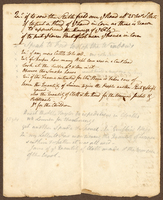 Whitehall list of plantation tasks including the enslaved women's clothing measurements, undated The beginning of the list includes farm tasks such as inspecting the smoke house and decide if any more cattle are to be sold. The last item in ink is a direction to decide the amount of linen needed for new clothing for the enslaved people, including the children. The second page lists the amount of fabric needed for jackets and petticoats for the enslaved women. Those listed are Sylvia, Lucey [Lucy], Sarah, Nan, Jen, Tish, and the children Peg, Molly, Phin, Hannah, Sukey, Rachel(?), Grace, Dol, Stephen, and “3 little ones”.
Whitehall list of plantation tasks including the enslaved women's clothing measurements, undated The beginning of the list includes farm tasks such as inspecting the smoke house and decide if any more cattle are to be sold. The last item in ink is a direction to decide the amount of linen needed for new clothing for the enslaved people, including the children. The second page lists the amount of fabric needed for jackets and petticoats for the enslaved women. Those listed are Sylvia, Lucey [Lucy], Sarah, Nan, Jen, Tish, and the children Peg, Molly, Phin, Hannah, Sukey, Rachel(?), Grace, Dol, Stephen, and “3 little ones”. -
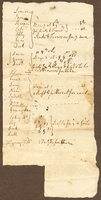 List of enslaved people at Whitehall with measurements for clothing, undated Written in Benjamin Chew's hand, the names included are: -Men - Lemon, James, Sharper, Cato, Abby, Enos, Dick -Boys – Aaron, Yarm, David -Women – Silva, Sarah, Lucy, Nan, Judith -Girls - Jane, Priscilla, Young Lucey [Lucy], Sukey, Peg, Beck, Ruth The last line is for 2 1/2 yards of fabric for the unnamed young children.
List of enslaved people at Whitehall with measurements for clothing, undated Written in Benjamin Chew's hand, the names included are: -Men - Lemon, James, Sharper, Cato, Abby, Enos, Dick -Boys – Aaron, Yarm, David -Women – Silva, Sarah, Lucy, Nan, Judith -Girls - Jane, Priscilla, Young Lucey [Lucy], Sukey, Peg, Beck, Ruth The last line is for 2 1/2 yards of fabric for the unnamed young children. -
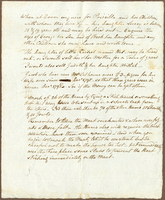 Note with instructions for multiple enslaved people at Whitehall, undated Undated note possibly in Benjamin Chew, Jr's hand, addressing the fates of numerous enslaved women and their children: "When at Dover enquire for Priscilla and her Children with whom they live & c – her Daughter Lucey [Lucy] is between 18 & 19 years old and may be hired out – Enquire the ages of George her Son and of Beck her Daughter and any other Children she may have and write to me” “The Daughter of little Rachel named Het may be hired out – or I would sell her & her Mother for a Term of years” “I would also sell Judith & her Daughter Abithah” “Jacob who lives near McCalhouns owes £3 – p year for his Wife ever since Dec 1795 – so that three years were in arrear Dec 1798 See if the Money can be got of him” The second half of the note discusses hams and other meat.
Note with instructions for multiple enslaved people at Whitehall, undated Undated note possibly in Benjamin Chew, Jr's hand, addressing the fates of numerous enslaved women and their children: "When at Dover enquire for Priscilla and her Children with whom they live & c – her Daughter Lucey [Lucy] is between 18 & 19 years old and may be hired out – Enquire the ages of George her Son and of Beck her Daughter and any other Children she may have and write to me” “The Daughter of little Rachel named Het may be hired out – or I would sell her & her Mother for a Term of years” “I would also sell Judith & her Daughter Abithah” “Jacob who lives near McCalhouns owes £3 – p year for his Wife ever since Dec 1795 – so that three years were in arrear Dec 1798 See if the Money can be got of him” The second half of the note discusses hams and other meat. -
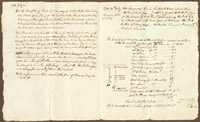 Notes on three enslaved women belonging to Whitehall, July 30, 1799 Multiple sections of notes, some taken from Porter's accounts. A particularly notable section can be found on its own page under July 30, 1799: "Het the Daughter of Rachel Jr was engaged to Wm Ruth at the Landing who wd have given £3 a yr for her but her Father Prince having the Liberty to procure a Place of his Choice put her to Mr Raymond’s who had determined to purchase her Time she could there 3 mo when Prince took her home again where she now remains” John Raymond was to settle wh Porter for Molly who has been with him & was to enter into a new agreem from last Jany upon Porter’s seeing him he said he wd purchase her Time & was to give £20 for her – Qu however the grounds of His fixing this Price the Girl is now 13 yr old & does a great deal of work & is reasonable at £3 for this year” Altho' Tish was gone to live with her Husbd Sam Calhoun before the People’s shoes arrived yet as She had gone thro the Summers Work &c J Porter gave her a Pair of the Shoes &c same being marked for her in Augt he also gave her a Pair of Stockings – Memo Her Husbd therefore is to return her equally fitted in this respect The last line notes that Porter informed him "there were but 16 pair of shoes sent up from Chester To[wnship?]."
Notes on three enslaved women belonging to Whitehall, July 30, 1799 Multiple sections of notes, some taken from Porter's accounts. A particularly notable section can be found on its own page under July 30, 1799: "Het the Daughter of Rachel Jr was engaged to Wm Ruth at the Landing who wd have given £3 a yr for her but her Father Prince having the Liberty to procure a Place of his Choice put her to Mr Raymond’s who had determined to purchase her Time she could there 3 mo when Prince took her home again where she now remains” John Raymond was to settle wh Porter for Molly who has been with him & was to enter into a new agreem from last Jany upon Porter’s seeing him he said he wd purchase her Time & was to give £20 for her – Qu however the grounds of His fixing this Price the Girl is now 13 yr old & does a great deal of work & is reasonable at £3 for this year” Altho' Tish was gone to live with her Husbd Sam Calhoun before the People’s shoes arrived yet as She had gone thro the Summers Work &c J Porter gave her a Pair of the Shoes &c same being marked for her in Augt he also gave her a Pair of Stockings – Memo Her Husbd therefore is to return her equally fitted in this respect The last line notes that Porter informed him "there were but 16 pair of shoes sent up from Chester To[wnship?]." -
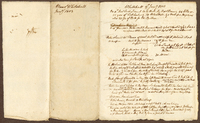 Whitehall memo of hiring out and management of enslaved people, January 09, 1803 First line states 55 yards of Ticklenburg, 13 blankets, one hogshead of molasses, and 23 yards of cloth for the children were sent to Whitehall, followed by 45 fleeces of wool taken to the weavers for men's and women's clothing. The fourth note on the list is regarding the hiring out Lucey, daughter of Priscilla: In the Sum[mer] of 1801 Tho Lee at Dover took Lucey [Lucy] Daughter of Priscilla @ $16 p an but in couret(?) of havg a child deducted $4 & took a note payable to himself for $12 & in 1802 from the date of the note Lee engaged her @15 pmo Porter to find her Cloaths, Lee to fund her Victuals & c". Following that, another daughter of Priscilla, Beck, was also hired out: Beck y__? daugh of Priscilla in May 1802 left Meredith & was hired to Jack Gibs yr Silversmith @$8 pan he finds Cloaths & c – this last in acct settled with Porter Jany 1804" Two lines down it is stated that Latitia has been sold to her husband, Sam Calhoun, for $90, to be paid in three payments by May 1804. The last line on this page describes new clothing for Sharper, Aaron, Little Jem, Abby, Dick, and Ben. The following page states that men's clothes are to be made from 46 yards of cloth and some additional linen, and Jacob Hill is making 18 pairs of shoes for men, women, and boys.
Whitehall memo of hiring out and management of enslaved people, January 09, 1803 First line states 55 yards of Ticklenburg, 13 blankets, one hogshead of molasses, and 23 yards of cloth for the children were sent to Whitehall, followed by 45 fleeces of wool taken to the weavers for men's and women's clothing. The fourth note on the list is regarding the hiring out Lucey, daughter of Priscilla: In the Sum[mer] of 1801 Tho Lee at Dover took Lucey [Lucy] Daughter of Priscilla @ $16 p an but in couret(?) of havg a child deducted $4 & took a note payable to himself for $12 & in 1802 from the date of the note Lee engaged her @15 pmo Porter to find her Cloaths, Lee to fund her Victuals & c". Following that, another daughter of Priscilla, Beck, was also hired out: Beck y__? daugh of Priscilla in May 1802 left Meredith & was hired to Jack Gibs yr Silversmith @$8 pan he finds Cloaths & c – this last in acct settled with Porter Jany 1804" Two lines down it is stated that Latitia has been sold to her husband, Sam Calhoun, for $90, to be paid in three payments by May 1804. The last line on this page describes new clothing for Sharper, Aaron, Little Jem, Abby, Dick, and Ben. The following page states that men's clothes are to be made from 46 yards of cloth and some additional linen, and Jacob Hill is making 18 pairs of shoes for men, women, and boys. -
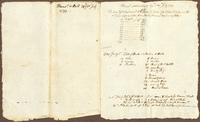 Memo at Whitehall, July 29 & 30, 1799 The first section breaks down the hands and stock at Whitehall, under January 1st: 10 Men 6 women 11 Children 6 horses 6 mules 95 head of Out cattle 21 yearlings 1 early Calf 1 Boar 8 Breeding Sows 59 small Hogs 24 young pigs 46 Head Sheep The rest of the memorandum focuses on clothing and fabric, including measurements of the enslaved people and number of shirts, shifts, blankets, and various petticoats and jackets.
Memo at Whitehall, July 29 & 30, 1799 The first section breaks down the hands and stock at Whitehall, under January 1st: 10 Men 6 women 11 Children 6 horses 6 mules 95 head of Out cattle 21 yearlings 1 early Calf 1 Boar 8 Breeding Sows 59 small Hogs 24 young pigs 46 Head Sheep The rest of the memorandum focuses on clothing and fabric, including measurements of the enslaved people and number of shirts, shifts, blankets, and various petticoats and jackets. -
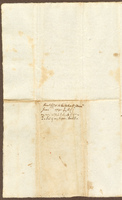 Whitehall Memo- List of enslaved people with notes on age and location, June 1790 List written by Benajmin Chew, Jr., with an additional list by his father from October 17, 1790. The list is separated by Men, Boys, and Women, as well as side notes on other individuals, most with ages: Men: old Lemmon say 40 Sharper says he is 52 Jem 29 or 30 Abbey Not more than 30 Cato 22 Enos 23 Dick Boys: 11 Aaron Rachel’s son 9 Yarm Lucey’s son Retd from (____?) in Apr 1790 - 11 Bill mother dead 7 Davy Lucey’s son Side Notes: Cooper hired to Dav Bellah £11.5 Davy 29 ys old [ditto[ £15 Sal Cooper’s daughter [ditto] Latitita to Cha Calhoon for Prov & Cloaths & sent to him Mar 10th 1789 Jem – Lucey’s Son abt 11 y old [ditto] Lucey retd (returned?) by Wm Calhoon now with Dick Butcher’s mother a Free Negro - Prist(?) Mother in Law Peg to Wm Denny & 1 yr due Nov 11 89 £7 Sarah wh Wm Calhoon Rachell & Child to Whitehart at £3 pr an Women: Old Silvia h Old Sarah 0 Good Rachel h Good Lucey [Lucy] h Lame Priscilla 0 Always (??) Nan h 19 Judith Sal’s o Jenny – ho Rachels Abt 14 born 31st Dec/89 Ben – ho Rachels 5 to tend (?) children Sukey- Nan’s h 5 Peg - Lucey [Lucy] 3 Mary - Lucey’s 1 yr old Jan[uar]y 1790 Phin - Lucey’s child Between 2 & 3 yr Beck - Nan's 3 Ruth - Rachels Ab2 Beck Priscill [sp] 2 Nancy - Rachels Born in Mar/90 Bet - Nan's Later note by Benjamin Chew: Letitia returned from Cohoon Jem returned Rachel returned from Whitehart and her child NB both to be sent back the child at least(?) & y Mo to be kind(?) out
Whitehall Memo- List of enslaved people with notes on age and location, June 1790 List written by Benajmin Chew, Jr., with an additional list by his father from October 17, 1790. The list is separated by Men, Boys, and Women, as well as side notes on other individuals, most with ages: Men: old Lemmon say 40 Sharper says he is 52 Jem 29 or 30 Abbey Not more than 30 Cato 22 Enos 23 Dick Boys: 11 Aaron Rachel’s son 9 Yarm Lucey’s son Retd from (____?) in Apr 1790 - 11 Bill mother dead 7 Davy Lucey’s son Side Notes: Cooper hired to Dav Bellah £11.5 Davy 29 ys old [ditto[ £15 Sal Cooper’s daughter [ditto] Latitita to Cha Calhoon for Prov & Cloaths & sent to him Mar 10th 1789 Jem – Lucey’s Son abt 11 y old [ditto] Lucey retd (returned?) by Wm Calhoon now with Dick Butcher’s mother a Free Negro - Prist(?) Mother in Law Peg to Wm Denny & 1 yr due Nov 11 89 £7 Sarah wh Wm Calhoon Rachell & Child to Whitehart at £3 pr an Women: Old Silvia h Old Sarah 0 Good Rachel h Good Lucey [Lucy] h Lame Priscilla 0 Always (??) Nan h 19 Judith Sal’s o Jenny – ho Rachels Abt 14 born 31st Dec/89 Ben – ho Rachels 5 to tend (?) children Sukey- Nan’s h 5 Peg - Lucey [Lucy] 3 Mary - Lucey’s 1 yr old Jan[uar]y 1790 Phin - Lucey’s child Between 2 & 3 yr Beck - Nan's 3 Ruth - Rachels Ab2 Beck Priscill [sp] 2 Nancy - Rachels Born in Mar/90 Bet - Nan's Later note by Benjamin Chew: Letitia returned from Cohoon Jem returned Rachel returned from Whitehart and her child NB both to be sent back the child at least(?) & y Mo to be kind(?) out -
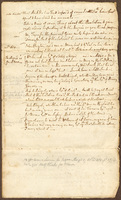 "Memo made at Whitehall" with list of enslaved people & measurements, ages of children, and those hired out in December 1793 This memorandum primarily focuses on the enslaved people of Whitehall. It begins with a "List of Negroes" documenting the status of new shoes and shifts, and in some cases stockings. First listed are the men; Lemon, James, Sharper, Abby, Cato, Enos, Dick, Bill, Aaron, Jem Jr., followed by the women with the note " Linnen for shifts ready" at the end of their names: Silvia, Sarah, Lucy, Nan, Jenny, Tish. Jenny is noted to be 16 years old, and Tish being 18. Lucey children and their ages follow, including Peg, Molly, Phin, Hannah, and twins Lucey and Rachel. Then Nan's children Suk [Sukey], Grace, and Beck, then Tish's children Dol and Bet, and finally Jenny's son Stephen. The next section lists those who were hired out and where or to whom: -Davy hired to Bellah -Rachel with 3 Children lived wh Collin's Jack for Victuals & Cloaths Sarah's Child: -Rachel Jr. with 1 child lives with her Father Collins' Abram [Abraham?] -Jude - same as Rachel noted to be "now again big with child" [Both children include the note "refuse to be hired"] Lucy's Child: Yarm (12 yr) lives with Rob[ert] Denney near Martin's Bridge for Victuals & c[lothes] Davy [lives] with W. Cumberfoot 16 - Sal with Thos Jones at £3 - NB S[ai]d to be big w Child Priscilla with 1 child at Dover Lucey [Lucy] her child lives w Stephen Allston Sarah lives with W[illia]m Calhoun 40 Peg lives with Wm Denny The following page includes information on the enslaved people's clothing, such as stating that a "large man's shirt" requires 3 1/2 yards of linen, and a woman's shift requires 2 1/2 yards.
"Memo made at Whitehall" with list of enslaved people & measurements, ages of children, and those hired out in December 1793 This memorandum primarily focuses on the enslaved people of Whitehall. It begins with a "List of Negroes" documenting the status of new shoes and shifts, and in some cases stockings. First listed are the men; Lemon, James, Sharper, Abby, Cato, Enos, Dick, Bill, Aaron, Jem Jr., followed by the women with the note " Linnen for shifts ready" at the end of their names: Silvia, Sarah, Lucy, Nan, Jenny, Tish. Jenny is noted to be 16 years old, and Tish being 18. Lucey children and their ages follow, including Peg, Molly, Phin, Hannah, and twins Lucey and Rachel. Then Nan's children Suk [Sukey], Grace, and Beck, then Tish's children Dol and Bet, and finally Jenny's son Stephen. The next section lists those who were hired out and where or to whom: -Davy hired to Bellah -Rachel with 3 Children lived wh Collin's Jack for Victuals & Cloaths Sarah's Child: -Rachel Jr. with 1 child lives with her Father Collins' Abram [Abraham?] -Jude - same as Rachel noted to be "now again big with child" [Both children include the note "refuse to be hired"] Lucy's Child: Yarm (12 yr) lives with Rob[ert] Denney near Martin's Bridge for Victuals & c[lothes] Davy [lives] with W. Cumberfoot 16 - Sal with Thos Jones at £3 - NB S[ai]d to be big w Child Priscilla with 1 child at Dover Lucey [Lucy] her child lives w Stephen Allston Sarah lives with W[illia]m Calhoun 40 Peg lives with Wm Denny The following page includes information on the enslaved people's clothing, such as stating that a "large man's shirt" requires 3 1/2 yards of linen, and a woman's shift requires 2 1/2 yards. -
 Memos regarding the enslaved people of Whitehall by Benjamin Chew, 1791 The first page of this document is composed of a list varied tasks over 1791 to be done at Whitehall from Benjamin Chew to his son in the management of Whitehall. The first page includes the inquiry "Has Ford got my Negro's winter cloathes, the mens full'd & the Women's wove only I sent him lately 150 yds Linnen w[hi]ch is more than will give them all great & small 2 shirts and shifts a piece. What is left he should preserve. I sent him also 17 p[airs] pf shoes & one of my Fin[e?] bags wch you must bring back to me." The other side of this page is written in Benjamin Chew Jr.'s hand, titled "Memo taken from a lone Paper of my Father dated April 25th 1791. The first line states that enslaved women Tish or Latitia are to be hired out to Allen Whitehart, noting that Whitehart owes them for the hire of Rachel from 1788-1790, owing "a Ball of about 14 Dols [dollars?]". Judith is to be sent to Black Abraham, her father, " living adjoining Sterling's" at £5 pan (?). The next line reads "Rachel and her child called Little Rachel to Same Person [__?] £3. The next section reads "Tish or Latitia is taken from A. Whitehart where Both her children died and she is with Wm. Wharton near the Methodist Meetinghouse" The following line reads, "Sal- Daughter of Cooper is ret'd from Bellah's he having no further occasion for her Whitehall- Gave her Liberty to get herself a good Place to be approved of by Ford within a Week." The remainder of the page is a list of enslaved people's names starting with the men and women: Sharper, Jem, Abby, Cato, Enos, Dick, Lemon, Aaron, Jem - Lucy's son, Yarm, Bil, Davy (- 9 yr old, Lucy's son), Ben, Silvia, Sarah. Rachel, Lucy, Priscilla, Nan - ready to lay in, Sal - from Bellah, Jenny. Followed by the children: Sukey, Peg, Mary, Phin, Beck - Nan's child, Ruth, Beck - Pris'a [Priscilla] Child, Nan - Rachel's, Bet - Nan's, Hannah- Lucy's 7 mo old, Davy - wh [with?] Bellah, Tish wh Wharton, Judith & Rachel - with Abraham.
Memos regarding the enslaved people of Whitehall by Benjamin Chew, 1791 The first page of this document is composed of a list varied tasks over 1791 to be done at Whitehall from Benjamin Chew to his son in the management of Whitehall. The first page includes the inquiry "Has Ford got my Negro's winter cloathes, the mens full'd & the Women's wove only I sent him lately 150 yds Linnen w[hi]ch is more than will give them all great & small 2 shirts and shifts a piece. What is left he should preserve. I sent him also 17 p[airs] pf shoes & one of my Fin[e?] bags wch you must bring back to me." The other side of this page is written in Benjamin Chew Jr.'s hand, titled "Memo taken from a lone Paper of my Father dated April 25th 1791. The first line states that enslaved women Tish or Latitia are to be hired out to Allen Whitehart, noting that Whitehart owes them for the hire of Rachel from 1788-1790, owing "a Ball of about 14 Dols [dollars?]". Judith is to be sent to Black Abraham, her father, " living adjoining Sterling's" at £5 pan (?). The next line reads "Rachel and her child called Little Rachel to Same Person [__?] £3. The next section reads "Tish or Latitia is taken from A. Whitehart where Both her children died and she is with Wm. Wharton near the Methodist Meetinghouse" The following line reads, "Sal- Daughter of Cooper is ret'd from Bellah's he having no further occasion for her Whitehall- Gave her Liberty to get herself a good Place to be approved of by Ford within a Week." The remainder of the page is a list of enslaved people's names starting with the men and women: Sharper, Jem, Abby, Cato, Enos, Dick, Lemon, Aaron, Jem - Lucy's son, Yarm, Bil, Davy (- 9 yr old, Lucy's son), Ben, Silvia, Sarah. Rachel, Lucy, Priscilla, Nan - ready to lay in, Sal - from Bellah, Jenny. Followed by the children: Sukey, Peg, Mary, Phin, Beck - Nan's child, Ruth, Beck - Pris'a [Priscilla] Child, Nan - Rachel's, Bet - Nan's, Hannah- Lucy's 7 mo old, Davy - wh [with?] Bellah, Tish wh Wharton, Judith & Rachel - with Abraham. -
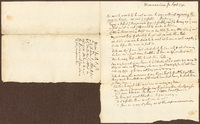 Memorandum for Benjamin Chew, Jr. regarding Whitehall, 1792 List of varied tasks to be done at Whitehall from Benjamin Chew to his son, ranging from paying taxes, managing Overseer Ford, and caring for the enslaved people. The list directs Chew, Jr. to "Take and carry the measures of my Negro's feet to chest [___?] to get their shoes made there. Write me if it can't be done that I may beseach them in Time here." He is also asking for a report on the preparation for "my Negro's woolen cloathing for both Men & Women. The Linnen I suppose I must provide." Chew also asks about the potential need for blankets and if they have meat.
Memorandum for Benjamin Chew, Jr. regarding Whitehall, 1792 List of varied tasks to be done at Whitehall from Benjamin Chew to his son, ranging from paying taxes, managing Overseer Ford, and caring for the enslaved people. The list directs Chew, Jr. to "Take and carry the measures of my Negro's feet to chest [___?] to get their shoes made there. Write me if it can't be done that I may beseach them in Time here." He is also asking for a report on the preparation for "my Negro's woolen cloathing for both Men & Women. The Linnen I suppose I must provide." Chew also asks about the potential need for blankets and if they have meat. -
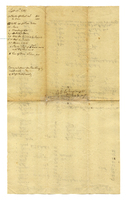 List of my Negroes in Kent taken August 1787 [by Benjamin Chew] List of Benjamin Chew's enslaved people, including their ages as well as some mothers and notes of where they've been hired out to. It is broken up in four sections: [untitled, but assumedly "Men", all of whom are likely at Whitehall] Lemon, Copper [Cooper?], James, Ben, Sharper, Cato, Abby, Enos, Dick, Jacob, Davy. Boys: Little James, Aaron, Bill, Yarm, David. Women: Sylvia, Salk[?], Rachel, Lucy, Priscilla, Rachel, Han, Sarah, Peg, Latitia. Girls: Jane, Sal, Sukey, Peg, Little Lucy, Berk, Ruth, Het, Judith.
List of my Negroes in Kent taken August 1787 [by Benjamin Chew] List of Benjamin Chew's enslaved people, including their ages as well as some mothers and notes of where they've been hired out to. It is broken up in four sections: [untitled, but assumedly "Men", all of whom are likely at Whitehall] Lemon, Copper [Cooper?], James, Ben, Sharper, Cato, Abby, Enos, Dick, Jacob, Davy. Boys: Little James, Aaron, Bill, Yarm, David. Women: Sylvia, Salk[?], Rachel, Lucy, Priscilla, Rachel, Han, Sarah, Peg, Latitia. Girls: Jane, Sal, Sukey, Peg, Little Lucy, Berk, Ruth, Het, Judith. -
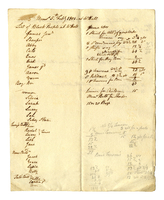 List of Black People at WHall, February 05, 1801 Memo listing enslaved workers of Whitehall, as well as linen and clothing. The list of the enslaved people reads: James Jem Sharper Abby Cato Enos Dick James Jr Aaron Yarm Boy Ben Women Sylvia Sarah Lucy Sal Sukey with Porter Lucy’s Childr Phin Rachel (Twins) Lucy (Twins) Tish Jane Nans Childr Jacob Grace Lydia Betty Sal’s Child Phillis Latitia Jr Tom
List of Black People at WHall, February 05, 1801 Memo listing enslaved workers of Whitehall, as well as linen and clothing. The list of the enslaved people reads: James Jem Sharper Abby Cato Enos Dick James Jr Aaron Yarm Boy Ben Women Sylvia Sarah Lucy Sal Sukey with Porter Lucy’s Childr Phin Rachel (Twins) Lucy (Twins) Tish Jane Nans Childr Jacob Grace Lydia Betty Sal’s Child Phillis Latitia Jr Tom -
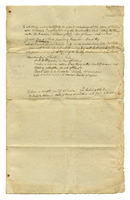 List of enslaved people at Whitehall, n.d. Undated document listing the enslaved people at Whitehall, as well as measurements. The other side of the document may be a list of some of the Overseer's responsibilities (likely Porter due to the line reading "wife to cut out shirts and womens cloathes if required"). The names and various ages and/or family relations include: Lemon James Sharper Abby Enos Cato Dick Aaron James Jr Yarm or David Sylvia Sarah Lucy Latitia Nan Jenny Sal Jr Sukey Lucy’s Child - Rachel, Lucy Jr 4 ys old Phil 8 ys, Hannah 7 ys another Child of Tish – Dol 4 ys Bill 1 yr Nan’s child – Grace 4 or 5 Jacob 2 Child of Sal Jr – Phillis 3 ys, Latitia Jr 8 mo Child of Jenny – Bob 1 yr Stephen 6-
List of enslaved people at Whitehall, n.d. Undated document listing the enslaved people at Whitehall, as well as measurements. The other side of the document may be a list of some of the Overseer's responsibilities (likely Porter due to the line reading "wife to cut out shirts and womens cloathes if required"). The names and various ages and/or family relations include: Lemon James Sharper Abby Enos Cato Dick Aaron James Jr Yarm or David Sylvia Sarah Lucy Latitia Nan Jenny Sal Jr Sukey Lucy’s Child - Rachel, Lucy Jr 4 ys old Phil 8 ys, Hannah 7 ys another Child of Tish – Dol 4 ys Bill 1 yr Nan’s child – Grace 4 or 5 Jacob 2 Child of Sal Jr – Phillis 3 ys, Latitia Jr 8 mo Child of Jenny – Bob 1 yr Stephen 6- -
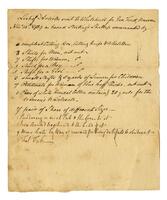 List of Articles sent to Whitehall, November 14, 1789 List of sundries for Overseer George Ford. The list is mostly composed of clothing for the enslaved workers, including shirts for the men, shifts and petticoats for the women, yards of linen and cotton for children's clothes and the women's waistcoats, and seven pairs of shoes.
List of Articles sent to Whitehall, November 14, 1789 List of sundries for Overseer George Ford. The list is mostly composed of clothing for the enslaved workers, including shirts for the men, shifts and petticoats for the women, yards of linen and cotton for children's clothes and the women's waistcoats, and seven pairs of shoes. -
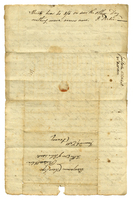 Joseph Porter to Benjamin Chew, October 30, 1802 Porter discussing the clothing needs of the enslaved people. They are preparing winter wear of "wooling cloathes", including shoes and stockings, and women's suits of wool. The wool itself is in production, part still at the mill and part already at being tailored.
Joseph Porter to Benjamin Chew, October 30, 1802 Porter discussing the clothing needs of the enslaved people. They are preparing winter wear of "wooling cloathes", including shoes and stockings, and women's suits of wool. The wool itself is in production, part still at the mill and part already at being tailored. -
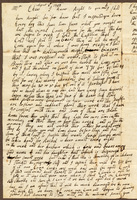 George Ford to Benjamin Chew regarding patterns of resistance by enslaved workers, August 03, 1797 Ford begins his letter explaining that they are behind on the harvest and states that "the people are so slow and indlent (?) about ther work that I have no comfort with them." Ford specifies that the women "are not worth ther vitles for what work they do" [sic]. Ford singles out Rachel and her daughter as well: "Rachel is hear amust every night in the weak and her husband which is free and bears avery bad name and her daughter heet which is bignough [big enough] to dow smart werk but insted of thatis levenine up in idelness" [sic].
George Ford to Benjamin Chew regarding patterns of resistance by enslaved workers, August 03, 1797 Ford begins his letter explaining that they are behind on the harvest and states that "the people are so slow and indlent (?) about ther work that I have no comfort with them." Ford specifies that the women "are not worth ther vitles for what work they do" [sic]. Ford singles out Rachel and her daughter as well: "Rachel is hear amust every night in the weak and her husband which is free and bears avery bad name and her daughter heet which is bignough [big enough] to dow smart werk but insted of thatis levenine up in idelness" [sic]. -
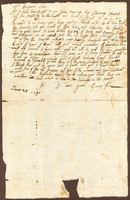 George Ford to Benjamin Chew, December 25, 1790 Letter in which Ford advises Chew that he has parted with two horses and "four of the women and two children are putout", but does not specify who.
George Ford to Benjamin Chew, December 25, 1790 Letter in which Ford advises Chew that he has parted with two horses and "four of the women and two children are putout", but does not specify who. -
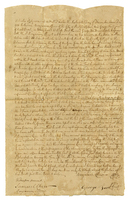 Agreement of responsibilities with George Ford as Whitehall Overseer, December 16, 1788 Agreement of responsibilities with George Ford as Whitehall Overseer, including management and maintenance of the farm and plantation, as well as the enslaved people of Whitehall. About half way down, the document declares that Ford willÿ"treat the Negroes onÿthe Farm committed to his Care will & tenderly keep TwoÿNegro Women when it shall be necessary to spin Linnen or Woollen yarn for all the Negro?s & attend particularly toÿthe providing for them good & sufficient Cloathing &ÿapparel, that he will in Time send for a physician to suchÿof them as may be ill & require assistance?. Witnessed by Samuel Chew and Benjamin Chew, signed by George Ford.ÿ There is also a note on the back stating that Ford has continued yearly on the same terms.
Agreement of responsibilities with George Ford as Whitehall Overseer, December 16, 1788 Agreement of responsibilities with George Ford as Whitehall Overseer, including management and maintenance of the farm and plantation, as well as the enslaved people of Whitehall. About half way down, the document declares that Ford willÿ"treat the Negroes onÿthe Farm committed to his Care will & tenderly keep TwoÿNegro Women when it shall be necessary to spin Linnen or Woollen yarn for all the Negro?s & attend particularly toÿthe providing for them good & sufficient Cloathing &ÿapparel, that he will in Time send for a physician to suchÿof them as may be ill & require assistance?. Witnessed by Samuel Chew and Benjamin Chew, signed by George Ford.ÿ There is also a note on the back stating that Ford has continued yearly on the same terms. -
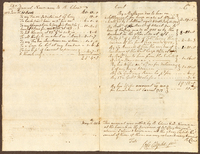 Whitehall account from Daniel Newman, 1753 Account between Daniel Newman and Benjamin Chew. Includes "by his wifes___ [?]ÿ for delivering 3 of my Negro Women". Also sold wheat to William Sturgis.
Whitehall account from Daniel Newman, 1753 Account between Daniel Newman and Benjamin Chew. Includes "by his wifes___ [?]ÿ for delivering 3 of my Negro Women". Also sold wheat to William Sturgis. -
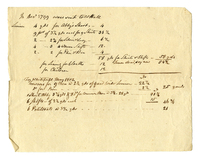 Receipt for linen purchased for enslaved people's clothing, 1799 and 1802 Linen "sent to W Hall" [Whitehall] purchased for shirts and shifts for Abby, Silvia, Lucy, and other unnamed women, and Phin and Ben. Also lining for "cloaths for Children" and Lemon, who is noted as dead. Linen also purchased in 1802 for trousers for men, shifts, another shirt for Abby, and six petticoats.
Receipt for linen purchased for enslaved people's clothing, 1799 and 1802 Linen "sent to W Hall" [Whitehall] purchased for shirts and shifts for Abby, Silvia, Lucy, and other unnamed women, and Phin and Ben. Also lining for "cloaths for Children" and Lemon, who is noted as dead. Linen also purchased in 1802 for trousers for men, shifts, another shirt for Abby, and six petticoats. -
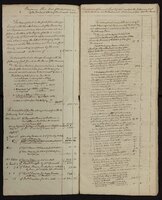 Estate of Samuel Chew-- Comprehensive account by Benjamin Chew, Jr. with details on Samuel's slaves, n.d. A detailed account book of expenses and disbursements of the goods of Samuel Chew's estate as rendered but its executor, Benajmin Chew, Jr. between 1809-1811. It records cash found in Samuel's home (in pockets, letters, etc.) and received from others, such as for the purchase of wheat, unspecified debt, and even the sale of "Negro Jemima" in Philadelphia for $120 on page 1. Almost directly across from it on the following page is an expense of eight blankets as "the Black People in Cecil were in want of bed cloathing." Also sent to the slaves was $183.50 worth of bacon from the Chestertown house to the farms in Cecil as "the Black People were out of meat." Further on is an appraisal of $70 for enslaved woman Charlotte, and her son for $10, bequeathed to Samuel's servant Elizabeth Constable for 7 years in his will. The account addresses certain slaves at Rich Neck plantation, including "the negro man named Dick" who "being very sickly" has been given the privilege of working when he is able and being taken care of by the estate, appraised at $75. Below, a child named Harriet is appraised for $5. At Great Plantation, a woman named Phillis has also been given privilege of being taken care of by the estate, despite being elderly and infirm. She is appraised at $5, while two other negro women "in like manner" named Molly and Patty are also appraised at $5. Moving on to Frisby's Meadows, there is an appraisal of negro women named Phoebe and her mother Lemon, as well as a 6 month old child named James, son of Phoebe. On the following page, $1 is recorded being paid to "a faithful old negro man from Swan Point who came to attend the remains of his master."
Estate of Samuel Chew-- Comprehensive account by Benjamin Chew, Jr. with details on Samuel's slaves, n.d. A detailed account book of expenses and disbursements of the goods of Samuel Chew's estate as rendered but its executor, Benajmin Chew, Jr. between 1809-1811. It records cash found in Samuel's home (in pockets, letters, etc.) and received from others, such as for the purchase of wheat, unspecified debt, and even the sale of "Negro Jemima" in Philadelphia for $120 on page 1. Almost directly across from it on the following page is an expense of eight blankets as "the Black People in Cecil were in want of bed cloathing." Also sent to the slaves was $183.50 worth of bacon from the Chestertown house to the farms in Cecil as "the Black People were out of meat." Further on is an appraisal of $70 for enslaved woman Charlotte, and her son for $10, bequeathed to Samuel's servant Elizabeth Constable for 7 years in his will. The account addresses certain slaves at Rich Neck plantation, including "the negro man named Dick" who "being very sickly" has been given the privilege of working when he is able and being taken care of by the estate, appraised at $75. Below, a child named Harriet is appraised for $5. At Great Plantation, a woman named Phillis has also been given privilege of being taken care of by the estate, despite being elderly and infirm. She is appraised at $5, while two other negro women "in like manner" named Molly and Patty are also appraised at $5. Moving on to Frisby's Meadows, there is an appraisal of negro women named Phoebe and her mother Lemon, as well as a 6 month old child named James, son of Phoebe. On the following page, $1 is recorded being paid to "a faithful old negro man from Swan Point who came to attend the remains of his master." -
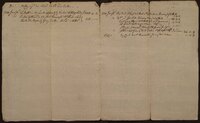 Accounts-- Expenses recorded by Benjamin Chew, Jr. for Samuel Chew, 1799 Copy of a short list of expenses by Benajmin Chew, Jr. for Samuel Chew. There are multiple lines for the plantation Whitehall and one for Duck Cross Roads. There is an expense for a porter/overseer for blankets, as well as a negro woman with the mention of cloth. The line is not legible enough to discern whether the payment is for the woman or something regarding cloth, perhaps for the enslaved women. The last line mentions "Henriette", but it is difficult to read what the context is.
Accounts-- Expenses recorded by Benjamin Chew, Jr. for Samuel Chew, 1799 Copy of a short list of expenses by Benajmin Chew, Jr. for Samuel Chew. There are multiple lines for the plantation Whitehall and one for Duck Cross Roads. There is an expense for a porter/overseer for blankets, as well as a negro woman with the mention of cloth. The line is not legible enough to discern whether the payment is for the woman or something regarding cloth, perhaps for the enslaved women. The last line mentions "Henriette", but it is difficult to read what the context is.
